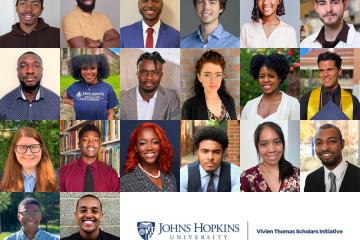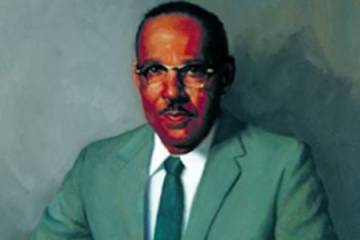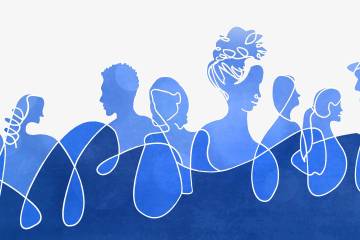- Name
- Johns Hopkins Media Relations
- jhunews@jhu.edu
- Office phone
- 443-997-9009
Johns Hopkins University's recently released diversity action plan, its Vivien Thomas Scholars Initiative, and leading Johns Hopkins disability equity expert Bonnie Swenor received recognition last week as part of a new White House effort to overcome historical inequities in access to the nation's science, technology, engineering, math, and medicine enterprise.
The White House Summit on STEMM Equity and Excellence was hosted on Monday, Dec. 12, by the White House Office of Science and Technology Policy (OSTP) in collaboration with the American Association for the Advance of Science and the Doris Duke Charitable Foundation. The event marked the launch of the STEMM Opportunity Alliance, which will coordinate activities across the U.S. government; businesses; and civic, academic, nonprofit, community-based, and philanthropic organizations to drive change in the nation's STEMM ecosystem by dramatically expanding access and opportunities. The alliance was established to help bring individuals from underrepresented backgrounds and communities into the U.S. STEMM workforce, including people with disabilities.
"People with disabilities face many barriers to being included in and benefitting from STEM," Swenor, founder and director of the Johns Hopkins Disability Health Research Center, said during a panel discussion about barriers to inclusion during last week's launch event. "But the two biggest barriers are ableism and a lack of accessibility. As a person with a disability myself, I can attest those are profound and pervasive threats to STEM equity. … Structural ableism is baked into our policies, our procedures, our programs, and much of STEM really is still undergirded by ableist ideas.
"Unfortunately, disability is not often part of these diversity, equity, and inclusion efforts," she added while crediting the Biden administration for making accessibility a focus of its efforts alongside diversity, equity, and inclusion.
Swenor, who is also an associate professor at JHU's School of Nursing, serves on the STEMM Opportunity Alliance advisory council.
Thank you @WhiteHouse for celebrating the Vivien Thomas Scholars Initiative at @JohnsHopkins. With our HBCU and MSI partners, and the support of @BloombergDotOrg' Greenwood Initiative, we are working to diversify representation in STEM fields. Read more: https://t.co/I9ZWMU4LGx pic.twitter.com/iWAt5vFGhu
— Johns Hopkins University (@JohnsHopkins) December 13, 2022
The White House released a lengthy list of commitments made by STEMM Opportunity Alliance partners, including:
- JHU's Second Roadmap on Diversity, Equity, and Inclusion, an ambitious and wide-ranging set of 24 universitywide goals unveiled in December 2021, plus divisional goals developed over the past year. Progress updates will be shared publicly during an annual DEI Summit in the fall
- The Vivien Thomas Scholar Initiative, which aims to address historic underrepresentation by creating pathways for exceptional students from historically Black colleges and universities and minority-serving institutions to pursue PhDs in STEM fields at Johns Hopkins. The program, backed by a $150 million gift from the Bloomberg Philanthropies Greenwood Initiative, welcomed its first cohort of 20 scholars this past summer.
Over six years, the Vivien Thomas Scholar Initiative will grow to support 100 PhD students in JHU's more than 30 STEM programs at the schools of Arts & Sciences, Engineering, Medicine, and Public Health. It also includes the creation of new and expanded summer and post-baccalaureate experiences for talented, diverse undergraduates to build connections with Johns Hopkins faculty and students, and to provide exposure to the university's research and scholarship.
Earlier this year, the university committed an additional $5 million to support similar pathway programs in non-STEM fields.
"We are so delighted and honored to have both Dr. Swenor and the other Johns Hopkins DEI initiatives recognized," said Nancy Kass, vice provost for graduate and professional education and a professor of bioethics and public health. "One of our commitments at Hopkins is to continuously work to identify ways to bring students who have historically had less presence at R1 universities to Johns Hopkins."
Posted in University News
Tagged vivien thomas scholars










